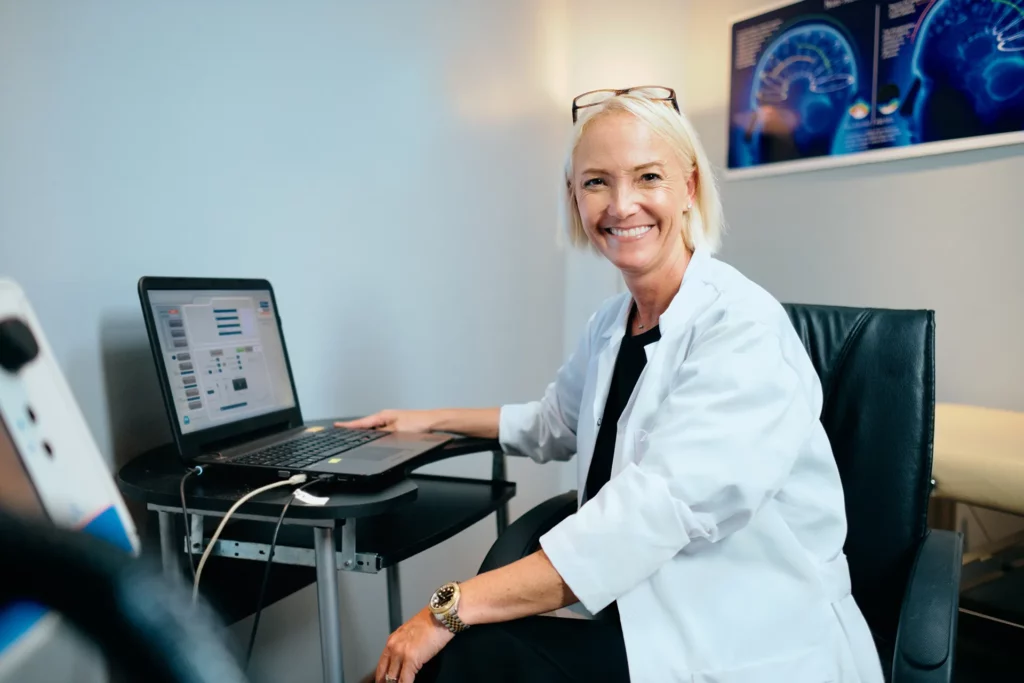Dementia Clinic
What do you do to help with Dementia?
Our clinic is dedicated to supporting individuals at every stage of dementia. We begin with a comprehensive assessment that gives us valuable insights into your cognitive health. From there, we offer a range of support options, including personalized lifestyle recommendations and medication options. We also run a neuromodulation service and have links with leading doctors and researchers (see neurostimulation page).
Why should I or my relative have a dementia assessment?
Many different things can cause memory problems. It is important to figure out the underlying cause so that lifestyle changes can put in place and the right treatment started early. Sometimes, the cause is not something like Alzheimer’s disease, but instead something different. Sometimes, the cause is reversible, to do with diet or even a problem with focus and attention, e.g. undiagnosed attention deficit hyperactivity disorder (ADHD).
Why would a patient come to this clinic?
Patients come to us because we offer a compassionate, thorough and thoughtful approach to dementia care. Patients can be seen quickly and receive care tailored to their needs. Our clinic gives you access to cutting-edge treatments and personalized care plans. With a focus on helping you maintain independence and to improve your quality of life, our team guides you through every step of your care journey.
Our Dementia Memory Clinic Pathway
Cognitive Assessment
One of our team will conduct a thorough background history, medical history and memory assessment.
Fee: £360
2
Brain Scan
You will then be referred for a specialised MRI scan which will give us a snapshot of your brain. A radiologist will write a report.
Fee: Approx £350-450 depending on location
3
Blood Tests
You may need to have a set of blood tests, depending on your initial assessment.
4
Follow up appointment
Your clinician will discuss the results of your scan and any other investigations, and reach a diagnosis. If appropriate, cognitive enhancing medications may be prescribed.
Fee: £360
Dementia? Take our quiz
Cognitive tests help assess changes in memory, attention, language, and other skills. These tests can be completed in a clinical setting or, in some cases, at home.
We have a simple, 5 question quiz, which is a starting point – click here to take quiz
One widely used, more detailed, self-administered test is the SAGE (Self-Administered Gerocognitive Exam). SAGE is a simple, paper-based test that can be completed at home to check for memory, problem-solving, and language skills. While SAGE can’t diagnose a condition, it can highlight early signs of cognitive impairment and indicate if further professional assessment is needed. Download for individual use here.
Cognitive tests administered by our team may include the Montreal Cognitive Assessment (MoCA), Addenbrooke’s Cognitive Examination and many others. We also have interactive tests in the clinic, such as the Stroop test which assesses executive function – e.g. planning and flexibility.
Can attention deficit hyperactivity disorder (ADHD) cause forgetfulness?
ADHD means that patients have difficulties in paying attention and focussing, and this can manifest as forgetting or losing things. Therefore ADHD can sometimes mimic early signs of dementia. In the dementia assessment, we will assess for any symptoms of ADHD as this can be treated if it’s the cause of the symptoms.
What are the DSM Cognitive Domains?
The DSM (Diagnostic and Statistical Manual of Mental Disorders) identifies six main cognitive domains affected in conditions like dementia and other cognitive disorders:
- Complex Attention – Focus, sustained attention, and the ability to process multiple pieces of information.
- Executive Functioning – Planning, decision-making, working memory, responding to feedback, and flexibility in thinking.
- Learning and Memory – The ability to remember new information, recall past events, and retain skills.
- Language – Communication skills, including speaking, understanding, reading, and writing.
- Perceptual-Motor Function – Coordination of movement, visual perception, and spatial orientation.
- Social Cognition – Understanding social cues, recognizing emotions, and responding appropriately to social situations.
Understanding these domains helps in evaluating and diagnosing cognitive impairment by identifying specific areas of difficulty.
Does dementia cause insomnia?
Sleep problems, such as insomnia, are common and we can help with behavioural techniques and, if needed, medications.
What do you do to help with Dementia?
Our clinic is dedicated to supporting individuals at every stage of dementia. We begin with a comprehensive assessment that gives us valuable insights into your cognitive health. From there, we offer a range of support options, including personalized lifestyle recommendations and medication options. We also run a neuromodulation service and have links with leading doctors and researchers (see neurostimulation page).
Why should I or my relative have a dementia assessment?
Many different things can cause memory problems. It is important to figure out the underlying cause so that lifestyle changes can put in place and the right treatment started early. Sometimes, the cause is not something like Alzheimer’s disease, but instead something different. Sometimes, the cause is reversible, to do with diet or even a problem with focus and attention, e.g. undiagnosed attention deficit hyperactivity disorder (ADHD).
Why would a patient come to this clinic?
Patients come to us because we offer a compassionate, thorough and thoughtful approach to dementia care. Patients can be seen quickly and receive care tailored to their needs. Our clinic gives you access to cutting-edge treatments and personalized care plans. With a focus on helping you maintain independence and to improve your quality of life, our team guides you through every step of your care journey.
What’s the difference between Dementia and Alzheimer’s?
Dementia is a catch-all term which means a change in memory, thinking or behaviour. Alzheimer’s is a common type of dementia (see Alzheimer’s page). In our clinic, we offer a ‘dementia assessment’ which covers all bases.
What is mild cognitive impairment?
Mild cognitive impairment (MCI) refers to changes in thinking, memory or behaviour which do not interfere with a person’s function as much as in dementia. It is a catch-all term like dementia, but meant to convey a milder clinical picture. Alzheimer’s can present as MCI in the early stages, and the progress to dementia, which simply means the symptoms have worsened.
Frequently asked questions
What’s the difference between Dementia and Alzheimer’s?
Dementia is a catch-all term which means a change in memory, thinking or behaviour. Alzheimer’s is a common type of dementia (see Alzheimer’s page for more information). In our clinic, we offer a ‘dementia assessment’ which covers all bases.
What is mild cognitive impairment?
Mild cognitive impairment (MCI) refers to changes in thinking, memory or behaviour which do not interfere with a person’s function as much as in dementia. It is a catch-all term like dementia, but meant to convey a milder clinical picture. Alzheimer’s can present as MCI in the early stages, and the progress to dementia, which simply means the symptoms have worsened.
Can attention deficit hyperactivity disorder (ADHD) cause forgetfulness?
ADHD means that patients have difficulties in paying attention and focusing, and this can manifest as forgetting or losing things. Therefore ADHD can sometimes mimic early signs of dementia. In the dementia assessment, we will assess for any symptoms of ADHD as this can be treated if it’s the cause of the symptoms.
What are the DSM Cognitive Domains?
The DSM (Diagnostic and Statistical Manual of Mental Disorders) identifies six main cognitive domains affected in conditions like dementia and other cognitive disorders:
- Complex Attention – Focus, sustained attention, and the ability to process multiple pieces of information.
- Executive Functioning – Planning, decision-making, working memory, responding to feedback, and flexibility in thinking.
- Learning and Memory – The ability to remember new information, recall past events, and retain skills.
- Language – Communication skills, including speaking, understanding, reading, and writing.
- Perceptual-Motor Function – Coordination of movement, visual perception, and spatial orientation.
- Social Cognition – Understanding social cues, recognizing emotions, and responding appropriately to social situations.
Understanding these domains helps in evaluating and diagnosing cognitive impairment by identifying specific areas of difficulty.
Does dementia cause insomnia?
Sleep problems, such as insomnia, are common and we can help with behavioral techniques and, if needed, medications.
Meet Our Team
Our Clinic
Neuro Clinics aims to bring world class care to patients suffering from neurological and psychiatric disorders. Our UK clinic is located in Oxfordshire, in a historic manor house. The beautiful gardens and site make for a therapeutic environment, where patients can take a walk in the greenery and visit the river Thames. If you are travelling to the clinic from abroad, Heathrow is an hour away, and there are many accommodation options in nearby Oxford. If driving, there is ample free parking, making for stress free visits.





